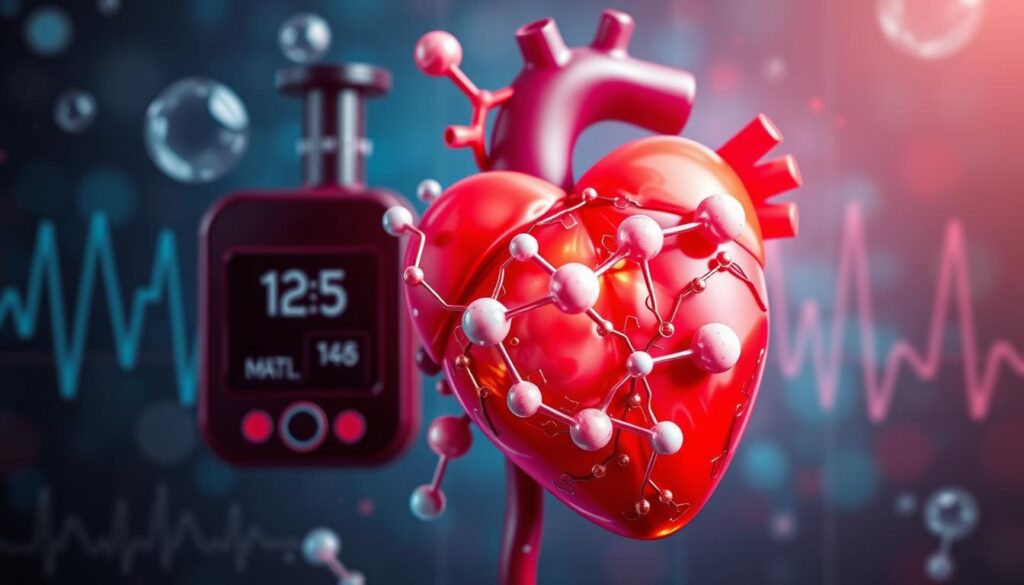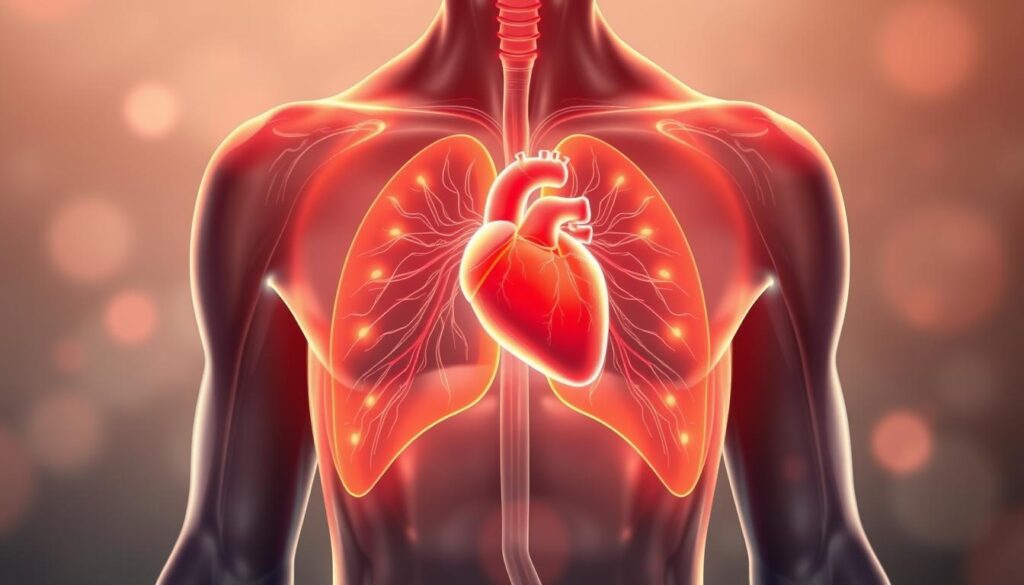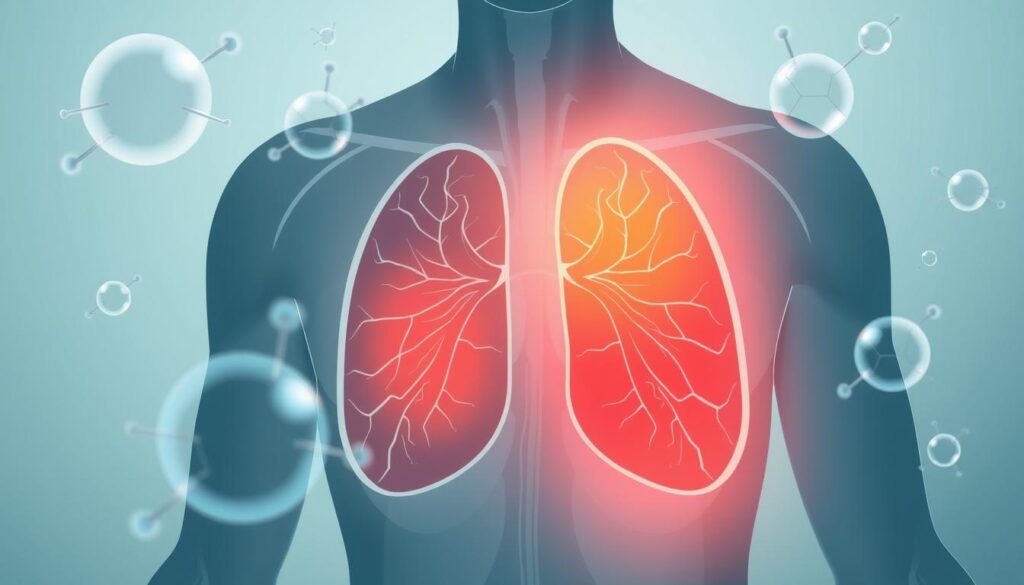If you have diabetes, managing your blood sugar is tough. But high blood sugar can hurt your heart too. People with diabetes face a big risk of heart problems.
Chest pain from high blood sugar is a serious sign. It means your heart might be in trouble. Knowing this can help you keep your heart safe.
Key Takeaways
- High blood sugar levels can contribute to the development of heart disease in people with diabetes.
- Chest pain may be a symptom of diabetic heart disease, including coronary artery disease and silent heart attacks.
- Effective management of blood sugar levels is crucial for reducing the risk of cardiovascular complications.
- Seeking medical attention for any chest discomfort or other unusual symptoms is essential, as prompt treatment can be lifesaving.
- Regular check-ups and proactive monitoring of heart health are crucial for people with diabetes.
Understanding the Link Between Blood Sugar and Chest Pain
Keeping your blood sugar levels healthy is key for your heart. High blood sugar, or hyperglycemia, can harm your heart. It raises the chance of chest pain and other heart problems.
How Hyperglycemia Affects Your Heart
High blood sugar can hurt your heart in many ways. It can damage blood vessels and nerves in your heart. This makes it hard for your heart to pump blood well.
This can cause plaque to build up in your arteries. This is called coronary artery disease. It can block blood flow to your heart, causing chest pain, or angina.
The Role of Blood Glucose in Cardiovascular Health
High blood glucose levels hurt your heart a lot. Diabetes, with its high blood sugar, increases heart disease risk. People with diabetes are more likely to get heart disease and heart failure.
It’s important to know how blood sugar and heart health are connected. This helps manage your overall health better.
“Diabetes can damage the nerves in the heart, leading to a lack of chest pain symptoms in diabetic heart disease cases.”
It’s vital to check your blood sugar often. Work closely with your doctor to keep your heart healthy. This helps avoid chest pain and other heart problems.
Can High Blood Sugar Cause Chest Pain: The Scientific Evidence
High blood sugar is linked to chest pain. Diabetes raises blood glucose levels. This is a big risk for heart disease, which can cause chest pain.
Studies show diabetes increases the chance of getting angina. In fact, more patients with diabetes got angina than those without (42.7% vs. 25.1%).
Diabetic patients with chest pain face higher risks. They are more likely to have heart problems and die from any cause. This shows high blood sugar can harm the heart, even without typical chest pain.
- Diabetic patients with chest pain face higher risks. They are more likely to have heart problems and die from any cause [2.29 (95% CI 1.54, 3.41)] and all-cause mortality [1.67 (95% CI 1.04, 2.69)] compared to non-diabetic patients.
- Patients with diabetes and atypical symptoms were nearly twice as likely to be diagnosed with angina compared to non-diabetic patients.
- Positive exercise stress test results were more common in diabetic patients, whether chest pain was recorded as typical (42.6% vs. 32.4%) or atypical (14.1% vs. 9.1%).
High blood sugar damages blood vessels. This reduces blood flow to the heart. It can cause chest discomfort or pain. Keeping blood sugar healthy is key for heart health and avoiding chest pain in diabetics.
“Effective management of blood glucose levels is essential in preventing the development of coronary artery disease and reducing the risk of chest pain in individuals with diabetes.”
Silent Heart Attacks and Diabetes: A Hidden Danger
Uncontrolled diabetes brings many risks, not just nerve damage and vision loss. It also raises the chance of a silent heart attack. This is a heart attack without the usual chest pain or discomfort.
Recognizing Subtle Warning Signs
People with uncontrolled diabetes chest tightness might have a silent heart attack. They might not feel any pain or just a little. Signs include feeling very tired, short of breath, heartburn, and a bit of chest pain.
Why Diabetics Are More Vulnerable
Diabetics are more at risk for silent heart attacks because of nerve damage. This damage can hide the usual chest pain signs of a heart attack.
Without clear signs, diabetics might not know they’re having a heart attack. This can lead to serious heart damage.
“Silent heart attacks can be particularly dangerous because the lack of obvious symptoms can delay diagnosis and treatment, ultimately leading to more extensive heart damage.”
It’s important to catch diabetes early and manage it well. Regular check-ups and watching blood sugar levels are key. Also, seeing a doctor right away for any strange symptoms can help prevent silent heart attacks.
Common Symptoms of Diabetic Heart Disease
If you have diabetes, knowing about heart health is key. Diabetes can raise your heart disease risk. Some symptoms are similar to those without diabetes, but there are special ones for diabetics.
Chest discomfort is a common sign. It feels like tightness, pressure, or pain in the chest. But, diabetes can make nerve damage, so some people might not feel the usual chest pain. They might just feel shortness of breath, irregular heartbeat, or persistent fatigue.
Other signs include swelling in the legs, difficulty breathing, and persistent heartburn. These symptoms can be subtle. It’s important to notice any changes and tell your doctor.
“Recognizing the subtle warning signs of diabetic heart disease is crucial for early intervention and prevention.”
Even without classic chest pain, watch your heart health if you have diabetes. Regular check-ups and healthy living can help. This can lower your risk of diabetes chest discomfort and high blood sugar cardiac symptoms.
How High Blood Sugar Damages Your Cardiovascular System
If you have diabetes, it’s important to know how high blood sugar hurts your heart. High blood sugar can damage your blood vessels and nerves. This can make your heart work less well.
Blood Vessel Deterioration
High blood sugar can cause plaque to build up in your arteries. This is called atherosclerosis. The plaque makes your blood vessels narrow and hard, reducing blood flow to your heart.
This can raise your risk of hyperglycemia chest pain, heart attack, and stroke.
Nerve Damage Impact
Diabetes can also damage your nerves, or neuropathy. This can affect the nerves that control your heart and blood vessels. It can make it harder to feel elevated blood glucose myocardial effects.
Neuropathy can also make it hard for your heart and blood vessels to work right.
Keeping your blood sugar in check is key to heart health. Exercise, a healthy diet, and following your meds can help. These steps can lower your risk of heart problems and help you live a healthier life.
| Cardiovascular Risk Factor | Percentage Affected |
|---|---|
| High blood pressure in adults with diabetes | 74% |
| Increased risk of stroke or heart disease death compared to those without diabetes | 2-3 times higher |
| Individuals with diabetes affected by peripheral neuropathy | 10-20% |
| Individuals with diabetes affected by diabetic nephropathy (kidney disease) | 1 in 3 |
Risk Factors and Prevention Strategies
If you have diabetes, you’re at a higher risk for heart disease. But, there are steps you can take to lower your risk. Knowing the risk factors and using preventive strategies can help protect your heart.
Key risk factors include being male, smoking, obesity, and having a big belly. Also, family history of heart disease and chronic kidney disease matter. Keeping your blood sugar in check is very important. High blood sugar can harm your heart over time.
To prevent and manage diabetic heart disease, focus on these strategies:
- Maintain a healthy blood sugar level through diet, exercise, and medication management.
- Manage your blood pressure and cholesterol levels with the help of your healthcare team.
- Adopt a heart-healthy diet rich in vegetables, fruits, whole grains, and lean proteins.
- Engage in regular physical activity, such as 150 minutes of moderate aerobic exercise per week.
- Quit smoking and avoid secondhand smoke exposure.
- Manage stress through relaxation techniques, social support, and counseling if needed.
- Undergo regular screenings for high blood pressure, cholesterol, and diabetes to catch any issues early.
By taking these steps, you can lower your risk of can high blood sugar cause chest pain and diabetic hyperglycemia coronary artery disease. Your heart health is key. With the right steps, you can live a healthier, more vibrant life.
| Risk Factor | Impact on Heart Health | Prevention Strategies |
|---|---|---|
| Smoking | Increases the risk of heart disease and stroke | Quit smoking and avoid secondhand smoke |
| Obesity and Excessive Belly Fat | Raises the risk of high blood pressure, high cholesterol, and heart disease | Maintain a healthy weight through a balanced diet and regular exercise |
| Family History of Heart Disease | Genetic factors can increase the likelihood of developing heart disease | Undergo regular screenings and work closely with your healthcare team to manage risk factors |
| Chronic Kidney Disease | Can lead to the buildup of waste products in the blood, raising the risk of heart disease | Manage diabetes and high blood pressure to prevent or slow the progression of kidney disease |
With the right preventive measures and a proactive approach, you can reduce your risk of can high blood sugar cause chest pain and other heart problems linked to diabetes.

Diagnostic Methods for Diabetes-Related Chest Pain
If you have diabetes and chest pain, get help fast. Chest pain can mean heart trouble. Finding it early is very important.
Your doctor will do tests to find out why you have chest pain. They want to check your heart health too.
Medical Tests and Procedures
Your doctor will first do a physical check.
- Electrocardiogram (EKG or ECG): This test checks your heart’s electrical activity.
- Echocardiogram: This test uses sound waves to see your heart.
- Stress test: This test checks how your heart works when you’re active.
- Coronary angiography: This test looks at your blood vessels with dye and X-rays.
When to Seek Emergency Care
If you have bad chest pain or trouble breathing, get help right away. This is very important if you have diabetes.
Call 911 or go to the emergency room fast. Quick help can save your life.
Treatment Options and Medication Management
Managing uncontrolled diabetes and chest tightness needs a full plan. Your doctor will make a plan just for you. This plan will cover your diabetes and heart health.
Medicines are key in this plan. Your doctor might give you drugs to control blood sugar and heart risks. New medicines, like SGLT2 inhibitors and GLP-1 agonists, help lower blood sugar and protect your heart.
It’s important to work with your doctor to find the right medicines for you. They will check your blood sugar, cholesterol, and other health markers often. This helps make sure your treatment is working well.
| Medication Type | Examples | Mechanism of Action | Potential Benefits |
|---|---|---|---|
| SGLT2 Inhibitors | Empagliflozin | Reduces blood sugar by inhibiting glucose reabsorption in the kidneys | Lowers risk of heart failure, heart attack, and cardiovascular death |
| GLP-1 Agonists | Liraglutide | Stimulates insulin production, suppresses glucagon, and slows gastric emptying | Reduces risk of heart attack, stroke, and cardiovascular death |
Managing uncontrolled diabetes and chest tightness is a team effort. You and your doctor can work together to make a good plan. This way, you can take charge of your health.

Conclusion
High blood sugar can cause chest pain and raise heart disease risk in people with diabetes. It’s important to understand how diabetes affects the heart. Knowing the signs and taking steps to prevent problems is key.
Regular doctor visits, following your medicine, and changing your lifestyle can help. These actions can lower your risk of heart disease and chest pain. Keeping an eye on your blood sugar and taking care of your heart is crucial.
It’s vital to manage high blood sugar to protect your heart. With the right information and effort, you can control your health. This way, you can avoid chest pain and other heart issues.


A Life-Changing Experience with This Weight Loss Supplement (Nagano Tonic)
I’ve always struggled with finding a weight loss solution that actually works for me. Like many, I’ve tried numerous diets, exercise routines, and supplements over the years—some worked for a short time, but nothing ever gave me long-term results. That was until I decided to try the weight loss supplement I found : Link to the Supplement.
From the moment I started using it, I noticed a difference. Not only did I feel more energized, but my cravings also became more manageable. The best part? I started seeing results much quicker than I anticipated! Over the course of just a few weeks, I noticed a significant reduction in belly fat and overall weight loss that I hadn’t been able to achieve before.
What makes this supplement stand out from all the others I’ve tried is how it supports me in my daily routine without any jitters or energy crashes. I’m able to stay focused and motivated, which has made it easier to stay on track with my diet and exercise plan.
This product truly exceeded my expectations, and I feel more confident and healthier than ever before. If you’re struggling with your weight loss journey like I was, I highly recommend giving this supplement a try. It’s been a game-changer for me, and I’m sure it can work wonders for you too!
Contant Them on email .. tonicnagano50@gmail.com
I’ve tried so many weight loss products over the years, but nothing worked like this supplement! Since I started using it, I’ve noticed a big difference in my energy levels and appetite control. In just a few weeks, I’ve lost weight and feel so much better. It’s been easy to stick with, and the results speak for themselves. Highly recommend this to anyone looking to make a real change!
wasn’t sure what to expect, but this weight loss supplement has really impressed me! After just a few weeks of use, I’ve already dropped a few pounds and feel more motivated to stay active. It’s helped curb my cravings and boosted my energy throughout the day. I’m excited to keep going and see even better results. Definitely worth trying!
Reach them on tonicnagano50@gmail.com
I was skeptical at first, but this supplement has truly made a difference in my weight loss journey. I’ve lost weight without feeling deprived or sluggish. My cravings are under control, and I feel more confident in my body. It’s easy to incorporate into my daily routine, and the results speak for themselves. I’m so glad I gave it a try!
Thanks David, i do use the link to make my purchase. you can get too here http://surl.li/iasppy
I’ve tried so many weight loss products, but this one has been by far the most effective. In just a few weeks, I’ve noticed a visible difference in my body and energy levels. It’s helped me stay on track without the constant hunger pangs and cravings. I’m really happy with my progress and can’t wait to see where I’ll be in another month!
This Nagano Tonic has been amazing! In just a few weeks, I’ve lost weight, feel more energized, and my cravings are under control. Highly recommend it!
Thats the link to purchase http://surl.li/iasppy